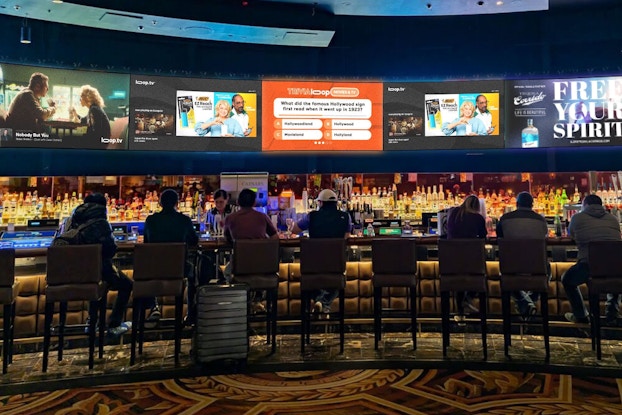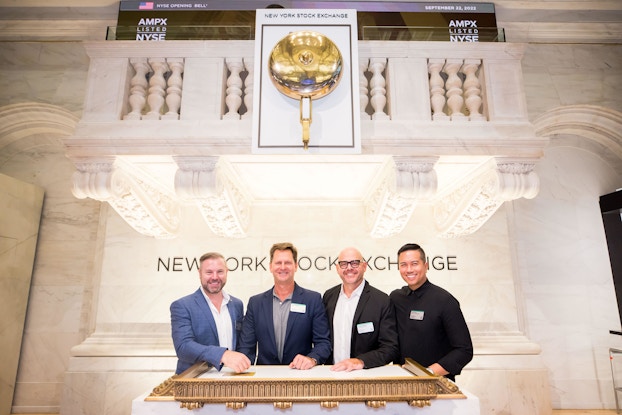
Why it matters:
- Consumers are seeking more out-of-home experiences in the wake of the pandemic, just as advertisers are seeking to reach consumers wherever they’re gathering.
- U.S. out-of-home advertising, where digital displays and streaming content appear at bus stops to malls and restaurants, is projected to grow 12% in 2022, reaching $7.93 billion.
- Against that backdrop, Loop Media, led by veterans of the media and entertainment sectors, marries programmatic advertising with digital out-of-home content, projects revenues of $67 million in 2023, leaning into consumers’ evolving viewing habits for growth.
Loop Media is rolling its unique business model for out-of-home entertainment to restaurants, retailers, and other venues, marrying digital advertising strategies with a deep library of streaming content that’s tailor-made for today’s consumer audience.
Jon Niermann, CEO and Co-founder, launched Loop in 2016 after a corporate career of about 22 years at The Walt Disney Co. and Electronic Arts. He has built a team of media-savvy personnel that have been driving exponential sales gains as advertisers have turned to digital out-of-home (DOOH) platforms to reach consumers.
“Think of what Roku, or other streaming platforms like Pluto, do for consumers,” said Niermann. “Loop does that for businesses, on public screens. The main difference is our content — it's all short form. Think music videos, blooper clips, action sports clips and other things that you can watch in a public setting.”
Tapping B2B and B2C markets for growth, as consumers and businesses alike gravitate from cable and satellite TV to streaming services
Loop offers its proprietary Loop Player free to businesses, through which they can select from Loop’s extensive library of content, supported by advertising. That includes music videos on more than 100 different channels, from Oldies to New Country to Club Mix, along with specialized music video channels tailored to specific types of businesses, such as Bar Anthems and Workout. It also has dozens of non-music content channels, including the TikTok Channel, drone footage, and videos from brands such as Disney and GoProTV.
Businesses such as retailers and restaurants that are seeking to provide an experiential environment are following in the path of households: They are ditching cable and satellite TV in favor of streaming services that can provide this kind of entertainment, Niermann said.
U.S. out-of-home advertising is projected to grow 12% in 2022, according to a recent Insider Intelligence report, reaching $7.93 billion.
As the pandemic subsided and consumers began returning to out-of-home gatherings in bars and restaurants, Loop Media stepped up its growth in these venues, and others. It now has a presence in all 50 states, streaming content on more than 30,000 screens. Customers include restaurant chains such as Texas Roadhouse and Yard House, as well as individual restaurant franchise operators of chains such as Applebee’s and McDonald’s.
Key to the business model is Loop’s use of a programmatic ad platform — an automated system for buying digital advertising spots — that is attracting a wide range of advertisers, from Fortune 100 companies to regional and local businesses. Programmatic ad platforms are designed to serve up ads automatically that are appropriate for the specific audiences.
U.S. out-of-home advertising is projected to grow 12% in 2022, according to a recent Insider Intelligence report, reaching $7.93 billion. The report described programmatic OOH as a “growing, but limited opportunity.”
A report earlier this year from the Out of Home Advertising Association of America noted that digital out-of-home was the fastest-growing segment of OOH, accounting for 28% of total OOH.
[Read more: Why Brands Are Investing in Digital Out-of-Home Advertising to Drive Business]
‘The world certainly doesn't need another media company’: What they do need is ‘companies that take the medium into the future’
Since launching its programmatic ad-supported business model in February of last year, Loop has been growing sales rapidly. It anticipates $30 million in revenues in 2022 and is projecting revenues of $67 million in 2023. The company has so far been reporting losses, but it expects to begin earning a profit as its revenues continue to scale, Niermann said.
“Our goal was not to build another out-of-home company,” said Bob Gruters, Chief Revenue Officer at Loop Media. “The world certainly doesn't need another media company, but what they do need is companies that disrupt and take the medium or take the entire environment and fast-forward into the future, which is what we did.”

Overall, in the digital advertising space, most ad dollars are spent through programmatic ad platforms, he said, which made it a logical revenue channel for Loop’s unique streaming services.
“The advertisers really appreciate the deep reach that they get, the frequency, and the ability to reach audiences in different spaces,” Gruters said.
[Read More: Inside How 3 Startups Generated Exponential Sales Growth on TikTok]
Niermann said part of the appeal of the platform to the companies that host the screens is the wide variety of high-quality content that they can choose from. That’s thanks to Loop Media’s team of 70-plus employees, many of whom, like him, have backgrounds in entertainment and media.
“Loop provides you the opportunity to pick and choose,” he said. “A doctor's office might want some Disney kids’ videos, or maybe nothing but funny, cute pet videos.”
Providing engaging content can benefit businesses such as bars, restaurants, and retailers because it’s engaging, and drives longer dwell times, Niermann said.
As the company continues to grow in both enterprise rollouts across large chains, it is also continuing to look for opportunities in independent neighborhood businesses, on college campuses, and anywhere else where it might capture viewership.
Potential venues include “any type of retail that has a large customer base milling around,” said Gruters.
The company is also working with its partners to determine what types of venues are best for the advertising community. Those may include malls, convenience stores, gas stations, specialty retail stores, supermarkets other heavily trafficked locations.
“We're focused on where the advertising investment’s going to go,” said Gruters.
CO— aims to bring you inspiration from leading respected experts. However, before making any business decision, you should consult a professional who can advise you based on your individual situation.
CO—is committed to helping you start, run and grow your small business. Learn more about the benefits of small business membership in the U.S. Chamber of Commerce, here.

What can membership do for your business?
Gain tools to stay informed, competitive, and connected by becoming a U.S. Chamber of Commerce member. Membership gives you direct access to expert policy insights, economic updates, and exclusive resources designed to help your business thrive. From behind-the-scenes analysis from D.C. to exclusive discounts and expert support, U.S. Chamber membership helps you navigate change and seize new opportunities.







